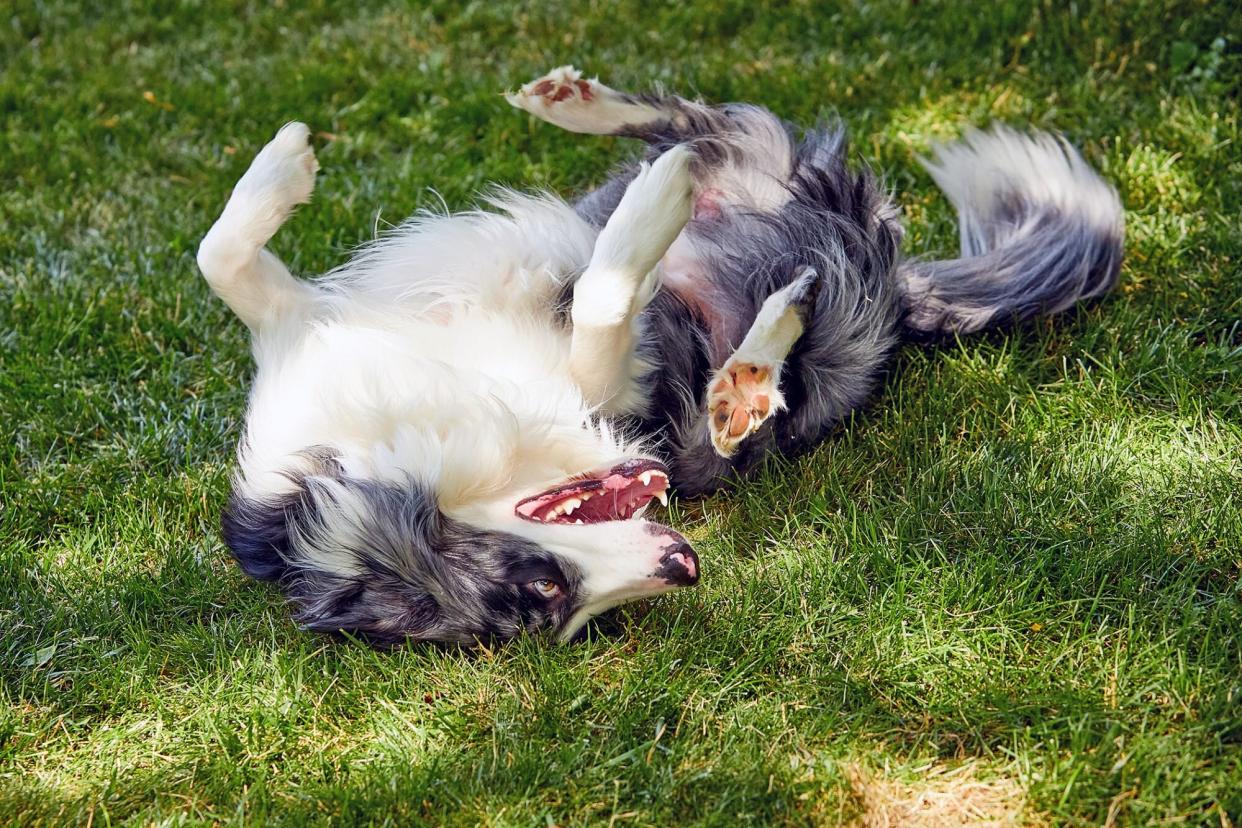Why Do Dogs Roll in the Grass?

Brie Passano
At first glance, the odd things our dogs do make no sense at all. But more often than not, there's a reason behind them. Eating rocks, for instance, can be because your dog is lacking key minerals ... or because he's bored. Burying bones and other items might harken back to instinctual "caching" behavior by saving something to gnaw on for later.
But why do dogs roll in the grass? Is there an explanation?
3 Reasons Why Dogs Roll Around in the Grass
Sometimes this behavior is about communication, or maybe it's to scratch a particular itch. Or it's simply because they can. We asked Miles Bensky, PhD, a pet behavior scientist with Purina, for more insight into why dogs roll around in grass.
They're Using Scent to Communicate
A dog's sense of smell is incredible. Humans have six million scent receptors; dogs have up to 300 million. This is the primary reason why they excel at scent-based jobs such as arson investigation, search and rescue, COVID detection, and more. And it's why you often find dogs rolling around outside.
"Grass-rolling may serve multiple purposes depending on a number of factors at play, but in general, it's probably about smell," Bensky says. "It's always important to remember that there are many odors in the environment that our human noses are blind to, but that are just screaming to dogs to be interacted with."
There are a few common theories regarding canines' sniffing communication, Bensky says, including:
Scent masking: "An ancestral holdover of when dogs were reliant on getting their own food, it's thought that sometimes rolling in grass and other things can be a way of covering up a dog's normal scent to help with sneaking up on prey," he says.
Scent marking: When walking your dog, you're probably familiar with all the stops he makes to mark with urine. But Benksy says rolling around on the ground is another method for dogs to distribute scent around their environment and say "I've been here," and "This is part of my space."
Scent journaling: "Rolling in grass, particularly grass with animal fur, feathers, or poop, is a great way for dogs to let other dogs know where they have been and what they have found," Bensky says. "It's a way of communicating to others about their environment." He adds that, again, what smells good to us and what smells good to a dog is often very different.
Getting rid of a "bad" scent: Ever notice how your dog wants to roll around right after a bath? It's the same concept. "While that shampoo smell and freshly-washed dog may be seen as an improvement to our noses, those fragrances may be too intense for your dog or just the wrong odor to them," Bensky explains. "Rolling around in the grass can be a way of getting back that au natural scent they prefer."
RELATED: Why Do Dogs Roll Around in Stinky Stuff?
They're Stretching
It's that simple. Just as we do, a healthy stretch feels good after a nice long walk or nap. Rolling around helps our pup pals loosen up their joints, remove loose fur, and boost circulation. Next best thing? Doga!
They're Expressing Happiness
"When dogs are happy, their behaviors are often loose and exaggerated. Just watch when dogs are playing with each other—you see lots of exaggerated bounding and rolling around," Bensky says. Being on their back and exposing their tummy is a vulnerable position, so when dogs are rolling around, "it can be a sign that they feel happy, safe, and are just having a good time."
Just remember: when your dog is rolling around in the grass on their back that this doesn't necessarily mean they want belly rubs or tickles. Some pups don't enjoy these touches!
How to Stop Your Dog From Rolling in the Grass
"Overall, rolling around in the grass or on the ground in general is a completely natural behavior—even when it involves your dog getting into some things that you might wish they had not," Bensky says.
So you don't necessarily need to stop your pooch from doing it, but you might want to train them to respond to your cues to not always flop down on the stinky stuff. Bensky recommends using positive reinforcement training such as strong recall or targeting to redirect your pet. "Just remember those smells can be highly distracting/enticing for dogs, so make sure you put in the time to work on these redirection behaviors with extremely reinforcing rewards," he says.
However, if you feel your pup is rolling around excessively—especially if their body language isn't loose or relaxed—and it seems like they're persistently trying to scratch an itch, it might be time for a veterinary consultation.
"Check with your vet to see if your dog is allergic to something in their food or environment and ways this can be mitigated," Bensky says.
RELATED: Dog Allergy Testing: How to Pinpoint the Cause of Your Pup's Itch

